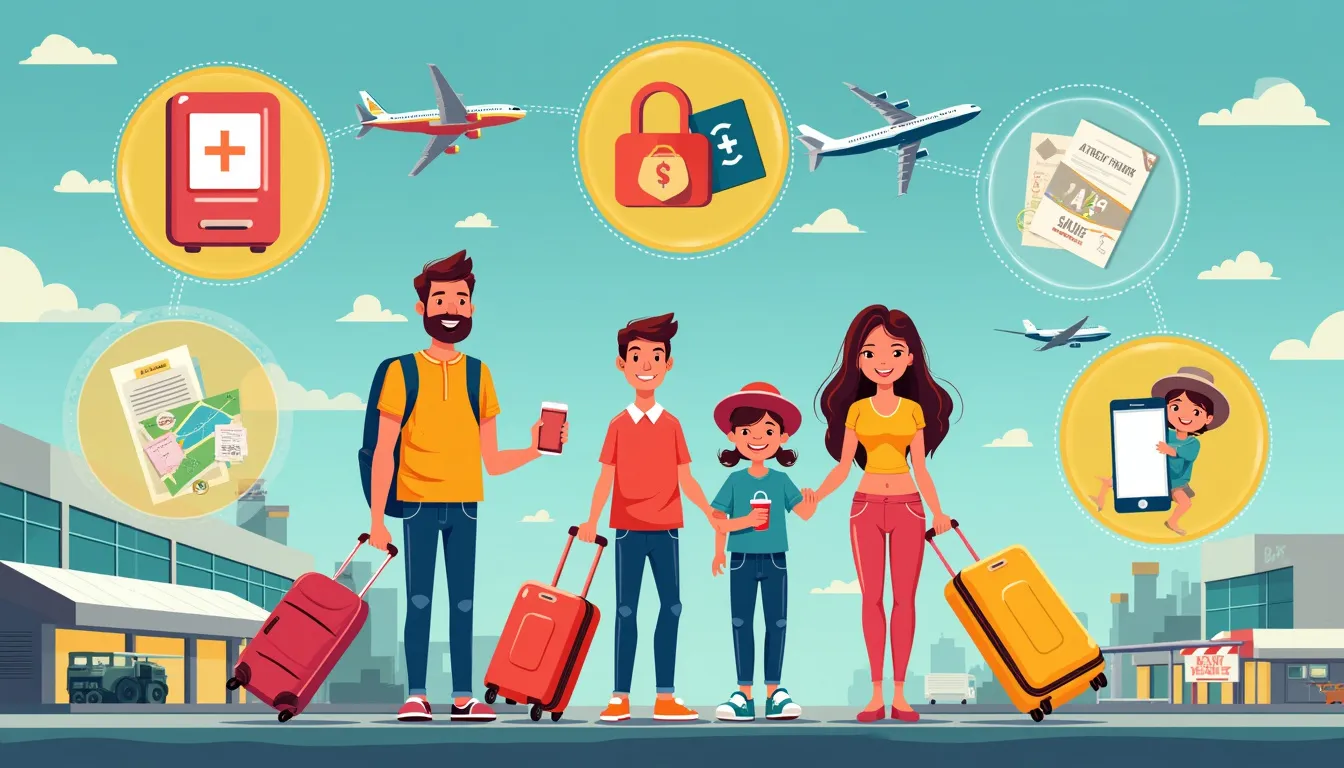Embarking on a new journey can be one of life’s great adventures, but ensuring your trip is safe is paramount for a truly worry-free experience. With an ever-changing global landscape and the unpredictability of new environments, staying informed and prepared is essential. This article delves into crucial travel safety tips that will help you navigate through your adventure with peace of mind. From meticulous preparation before you leave to staying vigilant while on the road, we’ll cover every aspect necessary for a secure journey. We’ll walk you through researching your destination thoroughly, including understanding safety ratings and travel advisories, securing travel insurance, and managing your important documents. Additionally, you’ll learn the importance of creating and sharing a detailed itinerary. Once you’re on the move, staying aware of your surroundings, using reliable transportation and accommodations, and securely handling your valuables, especially around public Wi-Fi, will be vital. By following these essential travel safety tips, you’ll be well-equipped to enjoy your travels while minimizing risks, ensuring your trip is as smooth and safe as possible.
Preparation Before Your Trip
Research Your Destination (Including Safety Ratings and Travel Advisories)
Before embarking on any journey, it’s imperative to thoroughly research your destination. Start by checking the safety ratings and travel advisories issued by reputable sources like government websites and international travel advisory organizations. These updates provide critical information about potential risks, such as political unrest, health issues, and crime rates. Knowing the current state of your destination will help you make informed decisions and prepare for any eventualities.
In addition to official advisories, consider reading traveler reviews and forums to get insights from recent visitors. Websites like TripAdvisor, Lonely Planet, and travel blogs offer firsthand accounts and practical travel safety tips that can be incredibly valuable. Pay attention to common issues raised by travelers, and make note of any areas to avoid or specific precautions to take.
When researching, also take time to learn about the local customs and laws of your destination. Understanding cultural norms and legal regulations can prevent you from inadvertently offending locals or engaging in illegal activities. For instance, some countries have stringent dress codes or prohibitions on certain behaviors that you should be aware of to ensure a respectful and lawful visit.
Secure Travel Insurance and Important Documents
Securing comprehensive travel insurance is a non-negotiable step in travel preparation. Travel insurance provides coverage for a wide range of unforeseen incidents, such as medical emergencies, trip cancellations, theft, and loss of personal belongings. Choose a plan that best suits your travel plans and the activities you intend to undertake. Ensure that your insurance covers medical evacuation, which can be crucial if you are visiting remote or underdeveloped regions.
Remember, accidents and emergencies can happen anywhere, and having the right insurance plan can save you a significant amount of stress and expense. Additionally, travel insurance often includes 24/7 assistance services, offering peace of mind knowing that help is just a call away.
In preparation for your trip, organize all necessary travel documents. This includes your passport, visas, travel insurance policy, plane tickets, and accommodation confirmations. Make photocopies of these documents and store them separately from the originals, as well as digitally on a secure cloud storage service. Having backup copies will expedite the process of getting replacements if your documents are lost or stolen.
It’s also wise to notify your bank and credit card companies of your travel plans. This way, they won’t flag your international transactions as fraudulent activities, which could lead to a temporary freeze on your accounts. Inquire about international fees and the best practices for using your cards abroad to avoid unexpected charges.
Create and Share a Detailed Itinerary
Creating a detailed itinerary is crucial for both organizational purposes and personal safety. Outline your daily travel plans, including accommodation details, transportation schedules, and contact information for local emergency services. A well-structured itinerary ensures that you can make the most of your trip and helps you stay on track with your plans.
Share your itinerary with trusted friends or family members. Keeping them informed about your whereabouts ensures that someone is aware of your movements and can act quickly if something goes wrong. Include details like flight numbers, hotel addresses, and planned excursions so your contacts have a clear picture of your itinerary.
In the age of digital convenience, several apps can assist in creating and sharing itineraries. Applications like TripIt or Google Travel allow you to compile all your travel information in one place and share it with your contacts with ease. These apps can also provide real-time updates, such as flight changes or weather conditions.
While an itinerary is a valuable tool, remain flexible. Travel often involves unexpected changes, and having the ability to adapt is part of the adventure. However, inform your designated contacts about any significant alterations to your plans, ensuring they are always aware of your revised schedule.
Preparing for a trip involves more than just packing your bags. Conducting thorough research, securing the necessary insurance and documents, and crafting a detailed itinerary are vital steps in ensuring a smooth and safe journey. By taking the time to plan meticulously, you set the foundation for a worry-free adventure, allowing you to immerse yourself fully in the experiences that await. Through these travel safety tips, you can travel with confidence, knowing that you are well-prepared for whatever comes your way.
Discover more travel tips and insights on our blog.

Stay Vigilant and Aware of Your Surroundings
When it comes to travel safety tips, the most fundamental advice is to always stay vigilant and aware of your surroundings. Whether you’re traversing bustling city streets, exploring remote trails, or simply enjoying a meal at a local café, maintaining a keen sense of awareness is crucial. Pay attention to the people around you, their actions, and any potential risks in the environment. Be cautious of overly friendly strangers or individuals who seem out of place, as they might be attempting to distract you or gain your trust for ulterior motives.
It’s also essential to be aware of local customs and cultural norms. In some destinations, specific behaviors or appearances can attract unwanted attention. Researching these cultural nuances ahead of time can help you blend in better and avoid standing out as a target. Avoid flaunting expensive items like jewelry, electronics, or large sums of cash in public places. These precautions can significantly reduce the risk of theft or other forms of crime.
One effective habit is to periodically assess your surroundings for escape routes and safe havens, such as nearby police stations or busy establishments. This mental mapping ensures you always have a plan in case of emergency. Additionally, consider investing in a discreet money belt or hidden pouch to keep your essential items like passports, credit cards, and emergency cash secure.
Use Reliable Transportation and Accommodation Services
Your choice of transportation and accommodation can greatly influence your overall travel safety. Opting for reputable and well-reviewed services can provide peace of mind and reduce the chances of encountering scams or criminal activity. When arriving at a new destination, try to arrange airport pickups or transfers through your hotel or trusted transportation companies instead of relying on unsolicited offers from strangers.
When using public transport, be cautious of your belongings and stay alert to your surroundings. Pickpockets often operate in crowded areas, so keep your bags close and avoid becoming engrossed in your phone or other distractions. For longer journeys, such as overnight buses or trains, it’s wise to book tickets in advance and choose reputable operators. This not only secures your seat but also ensures you are traveling with a trusted provider.
In terms of accommodation, always prioritize safety and reliability over cost. Ensure your hotel, hostel, or rental property has positive reviews, especially regarding security measures. Features such as 24-hour reception, secure locks, and in-room safes are essential. It’s also advantageous to stay in well-lit, busy areas rather than secluded neighborhoods.
If you are using services like Airbnb, make sure to check the host’s reviews and ratings thoroughly. Look for properties with high ratings specifically mentioning cleanliness and safety. Platforms like Airbnb often provide additional verification badges for hosts who have undergone background checks or identity verification, which can add an extra layer of security.
Keep Valuables Secure and Be Cautious with Public Wi-Fi
Protecting your valuables is a key component of travel safety. While it’s tempting to carry all your precious items with you, it’s often safer to leave some of your valuables in your accommodation’s secure storage options, like in-room safes or the hotel’s main safe. This minimizes the risk of losing everything in case of theft or misplacement.
When you do need to carry valuables, use anti-theft bags or travel accessories designed to deter pickpockets. Features such as lockable zippers, slash-proof materials, and RFID-blocking compartments can provide additional security. Always be mindful of your belongings, particularly in crowded places where opportunists might strike.
Another critical aspect of travel safety in the digital age is the cautious use of public Wi-Fi. While convenient, public networks, especially those without passwords, can be a hotbed for cybercriminal activities such as hacking and identity theft. To mitigate these risks, avoid accessing sensitive information, such as online banking or personal email accounts, over public Wi-Fi.
Instead, use a Virtual Private Network (VPN) to secure your internet connection. A VPN encrypts your data, making it much more challenging for hackers to intercept or steal your information. Many reliable VPN services offer user-friendly apps, making it easy to protect yourself with just a few clicks. Additionally, updating your devices and using strong, unique passwords for your accounts adds an extra layer of security.
By following these travel safety tips, you can ensure a safer and more enjoyable journey. Staying vigilant and aware of your surroundings, using reliable transportation and accommodation services, and securing your valuables while being cautious with public Wi-Fi are all essential components of a worry-free travel experience. Remember, the goal is to create lasting memories while prioritizing your safety and well-being.
In conclusion, employing essential travel safety tips is paramount for ensuring a worry-free journey. Thorough preparation before your trip, including researching your destination’s safety ratings and advisories, securing travel insurance, safeguarding important documents, and sharing a detailed itinerary, lays the groundwork for a secure travel experience. Once on the road, maintaining vigilance and awareness of your surroundings, using reliable transportation and accommodation services, and taking precautions to secure your valuables and data, like being cautious about public Wi-Fi usage, are critical steps to bolster your safety. Adhering to these travel safety tips can significantly mitigate potential risks, allowing you to focus on enjoying new experiences and making lasting memories. Always prioritize your safety to ensure that every adventure remains both exciting and secure.







